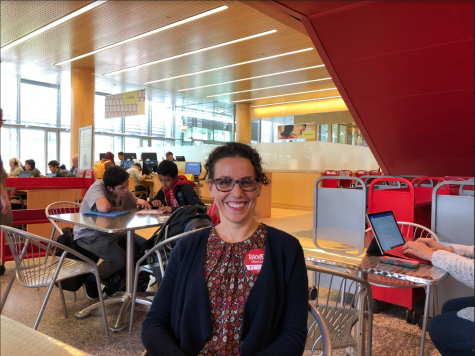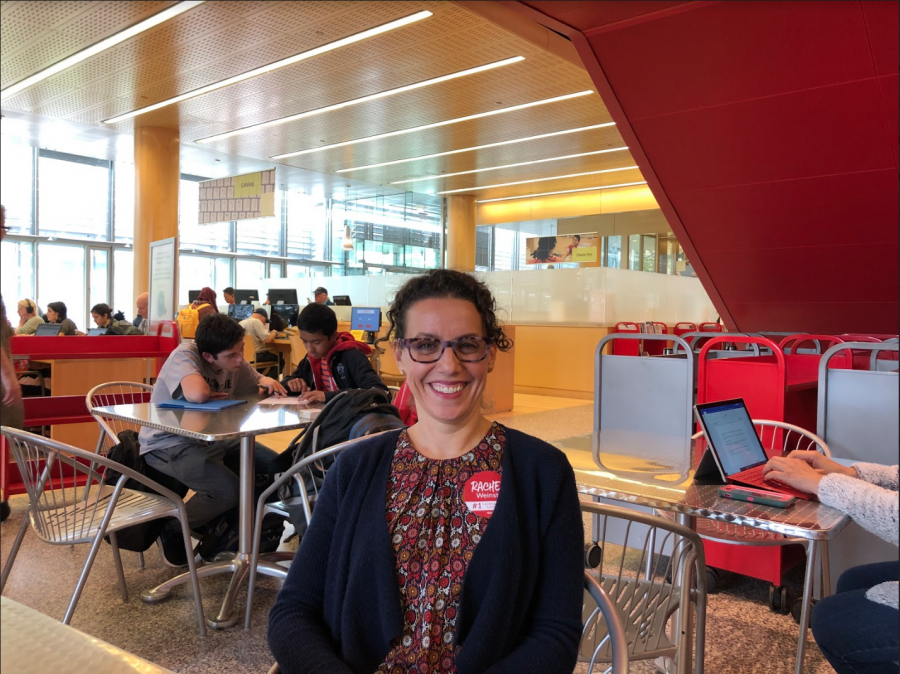This is Rachel Weinstein’s first campaign for School Committee.
Rachel Weinstein
Register Forum: What do you think distinguishes you from the other ten School Committee candidates?
Rachel Weinstein: So there are two main things that distinguish me, one is that I am the only candidate who is both a product of and a parent in the schools. So there are other candidates who either went through the schools themselves or now have kids in them and I’m both. So my level of connection and investment in the Cambridge public schools is incredibly deep. The other thing that distinguishes me is that my job title right now is Chief Collaboration Officer, so I am by nature and profession a collaborator. My job is to help the Boston public schools and charter schools and catholic schools work together and so that means taking this very diverse group of adults who all care a lot about students and families but have different ideas about how to serve them and help them figure out what is the shared agenda and how we move that forward and also how we address the conflicts that are normal, that are human, in a productive manner. I’ve been there for eight years, I’ve seen this organization through five superintendent transitions—I’m really proud that we’ve created this space where people come to the table, they share their vulnerabilities and they work through their issues. And I think that that’s the culture we need on the School Committee that frankly, we haven’t had the last couple years. There’s been sort of personality clashes getting in the way so I think that’s something that distinguishes me.
RF: How do you think the School Committee could be more effective?
RW: I’ll share two ideas of how the School Committee could be more effective. One is working as a team and really taking the time to make sure that the relationships are strong and productive and then the second thing is I think there are some process things that could make the School Committee a lot stronger so right now any member who wants just puts an agenda item on the agenda and its discussed then right? And we spend all this time making this strategic plan for the district shouldn’t we map out like the agendas in alignment with district plan and then that would give members time to go talk to students and teachers and families ahead an agenda item and have a well-informed position so I think that that’s a process thing, there are other process things … like right now we hear from the families that have the most privilege right because that’s who can come out to the meetings we should bring the School Committee into the community and rotate where the meetings are and make sure we’re getting the audience and partnership.

RF: What are your thoughts on the best strategies to close the achievement gap?
RW: I think the single most effective thing we can do is expand public early childhood education so my child went to Tobin Montessori. My child started at Tobin at age 3 and at age 5, which is the equivalent of kindergarten, everybody in their class was on their way to reading, which is amazing—I’ve walked into so many kindergarten rooms over the course of my career and its really unusual to see that. And it’s because they were in this environment that was rich in language and literacy that had highly trained adults and we just closed the gap right there, those are such powerful years so that’s definitely… like if I had to pick one thing that would be one. I also think that the achievement gap is not unrelated to the culture of our schools and that having adults who are more culturally proficient would allow students to feel more affirmed and have a sense of belonging and therefore more engaged. It’s hard to buckle down and do the work when you feel like teachers don’t understand you.
RF: What do you see as a strength of the Cambridge Public Schools that the School Committee could emphasize? What do you see as a weakness that the School Committee could fix?
RW: There are so many strengths of our schools, ranging from all the extracurriculars and all of the opportunities provided to students… best practices that happen in one school that should be shared with other schools right so one thing you mentioned the Haggerty so my upstairs neighbor works at the Haggerty and I’ve heard a lot about what those adults do to track individual students, not in level but track like how are they doing? Are they thriving? The family engagement that they do, they go out to the Fresh Pond Apartments/Rindge Towers, they go out to public housing developments and do working nights there instead of in the school. So there are practices like that or practices like at Cambridge Street Upper School the principal has been leading these weekly conversations unpacking our own biases for years or things like that that if every school did it it would be great so I think there’s a lot in our school district that we need to figure out how to share within. So I really think we have a lot of work to do on culture. So culture at three levels so I’m gonna say like classrooms, school, and policy. So the classroom level as you may have known because you read my stuff… my child is black. Already as an elementary school student, they had such a different experience than I did. And most of their teachers… I’d be happy to put my child in a one-room schoolhouse for twelve years with them but there were also adults who said things that were so racially charged that it took me weeks to calm down enough to go in and address them and that’s just not okay. So I think that we have a lot of cultural proficiency work to do, I was just talking with the 9th graders about like how do we do, how do we approach cultural proficiency and unpacking our own biases in a way that’s not just like this isolated training in workshop and professional development but like a systemic way, the way we have literacy coaches and math coaches like because I think it takes years to really change the culture of the school and the way people teach so that’s one. Cultural also at the school level, so I was apart of the building equality bridges. So I was apart of one of the sense-making teams of students and parents and teachers and we were looking at the teacher data for focus groups and the educator participatory action research. It’s really clear that in some of our schools, teachers feel safe and supported and in some, they don’t. And if the teachers don’t feel safe and supported how do you have a productive learning environment for young people? So I think like the culture of the district as an employer is very important and what does it mean to hold our administers accountable for having good school culture for everybody and then I already talked about the culture of the school committee in terms of being collaborative.
RF: I read on your website that one of your priorities is supporting all learners, which you kind of talked about a little bit but I was wondering if you could expand on that? And also your thoughts on tracking?
RW: So… here’s the thing, I am philosophically opposed to tracking. And I’ll tell you why because historically when you see and you see it when you walk into classes at Rindge right that like tracking just reinforces racial and socioeconomic gaps and we really don’t know young people’s intellectual potential when their brains are still developing. You know you can’t say oh you’re an advanced learner… and on top of that… the research shows that everyone benefits from being in a heterogeneous classroom and nobody’s harmed. So generally you’ll hear like the students who are most proficient or the students who are most behind do well in a mixed classroom that’s actually not true. So for all of those reasons I think we should have heterogeneous classrooms and it’s not the way most of our teachers have been trained to teach. So it’s the right thing to do, we need to make sure that our teachers have the skills and supports to do it well. So I’ve seen it done very well at the Tobin because the whole Montessori method is you have a multi-age classroom and nobody is doing the same thing at the same time and the teachers are trained to manage that situation. When I went through the high school there was a school within a school called pilot which as sort of the hippy-dippy school and our classes weren’t tracked and the teachers, like I took an English class called Reading and Writing on Human Values and what that does is you take an interesting topic that everyone can engage at no matter what their reading level is and then people could read different texts but you have a conversation about ethics that everyone’s learning from and not just learning from other people who’ve had the same life experience as them but other people who they might not otherwise know. And that’s like… that’s the beauty of Rindge is you’re creating these global citizens… So that’s my soapbox about meeting all learners like it’s the right thing to do and we need to give teachers the support to do it but it’s also very possible because we’ve seen it done in these other places.
RF: How have your experiences as a reading teacher and paraprofessional affected your decision to run/your mindset as a potential School Committee member?
RW: I was an AmeriCorps member at a middle school in San Francisco where I taught kids who were like three grade levels behind and then what I did at Graham and Parks was I was the paraprofessional to this sort of legendary math teacher Steve Parkin who was just one of those great teachers who did teach a mixed level class, who offered Saturday sessions and kids would come to them, just a really hands-on, great teacher so I learned a lot from him just watching his pedagogical approach to how he taught … I think both of those experiences as well as just having worked in and with many schools has given me this sort of breadth of the range of practice and what is possible and also an appreciation for not all schools have to be the same I think one of the strengths of Cambridge is that we do let each school sort of have its own flavor and then figure out how to balance that we have high expectations for all of those schools even if the culture is different but I think the schools can be such wonderful communities when the teachers feel some ownership about the way they’re doing things and families want to be at that particular school.
